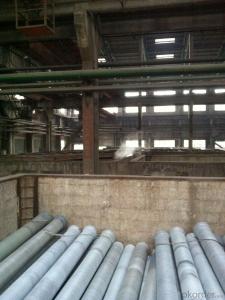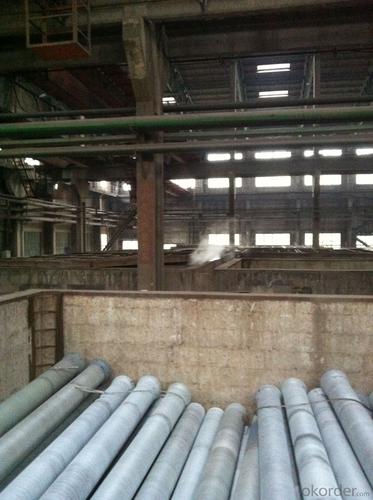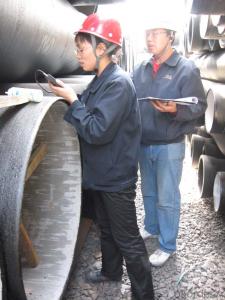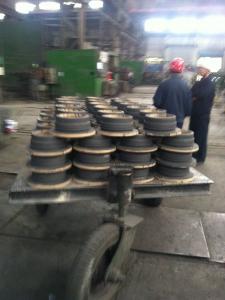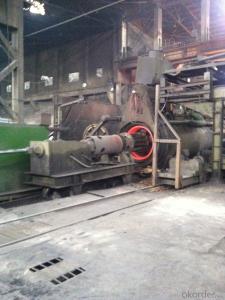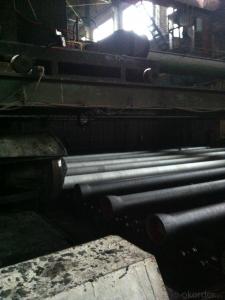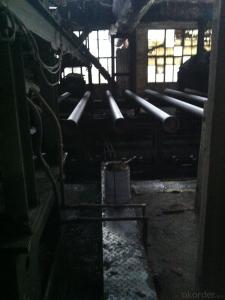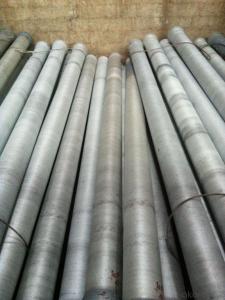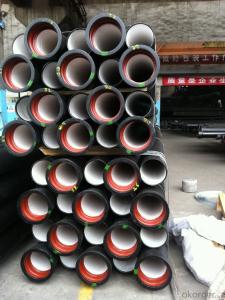DUCTILE IRON PIPE AND PIPE FITTINGS K9 CLASS DN450
- Loading Port:
- Tianjin
- Payment Terms:
- TT OR LC
- Min Order Qty:
- 21 pc
- Supply Capability:
- 3000 pc/month
OKorder Service Pledge
OKorder Financial Service
You Might Also Like
Material : Ductile Cast Iron
Size Range : DN 80mm to DN 2000mm
Unit Effective Length : 6m or 5.7m
Manufacture Standard: ISO 2531:1998/ EN 545:2006/EN 598:2007
Annual capacity : 200,000 tons
Coating Exterior: Zinc 130g/m2 according to ISO 8179-1 and bitumen coating 70 microns.
Cement Interior: Portland Cement/ High Alumina Cement/ Sulphate Resisting Cement Lining according to ISO 4179
Special requirements on external coating and internal lining can be applied
We also provide accessories such as SBR/EPDM rubber gaskets, lubricant paste, pipe caps, PE sleeves, etc.
Additional Parts:
Each pipe is strictly inspected according to related standard to ensure permanently high performance.
Easy Installation at site and service free for life
Long Service Lifespan
Quotation will arrive you within 24hours once we get your inquiry.
We guarantee offering you a competitive price.
A copy of original inspection reports of pipes will be offered after shipment.
Photos of loading process will be sent to the customer after shipment effect.
We will follow-up the delivery progress after shipment effect and update to the customer on weekly basis.
- Q: What are the typical pressure surge protection measures for ductile iron pipe?
- There are several typical pressure surge protection measures for ductile iron pipe that help ensure its integrity and longevity. These measures include: 1. Surge tanks: Surge tanks are commonly used to absorb pressure surges and minimize their impact on the ductile iron pipe. These tanks are typically installed at critical points in the pipeline system, such as at pump stations or near valves, to provide a reservoir for excess pressure. 2. Air release valves: Air release valves are essential components in ductile iron pipe systems that help release trapped air and prevent the formation of air pockets. These valves help maintain a stable pressure within the pipe and reduce the risk of pressure surges during operation or sudden changes in flow. 3. Pressure relief valves: Pressure relief valves are designed to protect ductile iron pipes by releasing excess pressure when it exceeds a predetermined threshold. These valves are typically installed at strategic locations in the pipeline system and are set to open when the pressure exceeds a safe limit, diverting the excess pressure to prevent damage to the pipe. 4. Surge suppressors: Surge suppressors are devices that are installed in ductile iron pipe systems to absorb and dissipate pressure surges. These devices act as shock absorbers, reducing the impact of pressure fluctuations and preventing damage to the pipe. Surge suppressors are particularly effective in situations where pressure surges are frequent or severe. 5. Pipe wall thickness: Another crucial measure for pressure surge protection in ductile iron pipe is ensuring an appropriate pipe wall thickness. By selecting a pipe with the correct wall thickness, engineers can ensure that the pipe can withstand the pressure surges it may encounter during operation. This helps prevent pipe failure or rupture due to excessive pressure. It is important to note that the specific pressure surge protection measures implemented for ductile iron pipe may vary depending on the specific application, pipe size, operating conditions, and regulatory requirements. Consulting with experts in pipeline engineering and design is crucial to determine the most suitable pressure surge protection measures for a particular ductile iron pipe system.
- Q: What are the advantages of using ductile iron pipes?
- Using ductile iron pipes in various applications offers several advantages. To begin with, ductile iron pipes possess a high strength-to-weight ratio, making them a cost-effective option for transporting fluids or gases. They can endure high internal and external pressures, ensuring the dependable and efficient transportation of materials. Furthermore, ductile iron pipes exhibit exceptional corrosion resistance. They are impervious to rust and other forms of corrosion, expanding their lifespan and reducing maintenance expenses. This makes them suitable for underground and underwater applications where corrosive elements are present. Moreover, ductile iron pipes demonstrate superior ductility, enabling them to withstand heavy external loads and impacts without cracking or breaking. This renders them less vulnerable to damage during installation or exposure to harsh environmental conditions. In addition, ductile iron pipes possess excellent flow characteristics. Their smooth inner surface minimizes friction and pressure losses, resulting in efficient fluid flow and reduced pumping costs. This is particularly advantageous in applications requiring high flow rates or long-distance transportation. Additionally, ductile iron pipes are environmentally friendly. They are produced from recycled materials and can be recycled themselves, reducing the demand for raw materials and minimizing environmental impact. Furthermore, their prolonged service life diminishes the need for frequent replacements, further reducing waste generation. Lastly, ductile iron pipes offer versatile installation options. They can be installed using various techniques like trenchless methods, which minimize disruption to the surrounding environment and lower installation costs. Their adaptability and ease of installation make them a preferred choice for various construction projects. Overall, the benefits of utilizing ductile iron pipes encompass their high strength, corrosion resistance, ductility, flow characteristics, environmental friendliness, and versatile installation options. These factors establish them as a reliable and cost-effective choice for numerous applications in various industries.
- Q: Can ductile iron pipes be used for oil and gas pipelines?
- Yes, ductile iron pipes can be used for oil and gas pipelines. Ductile iron is a strong and durable material that is resistant to corrosion, making it suitable for transporting oil and gas over long distances. Additionally, ductile iron pipes have excellent pressure-bearing capabilities, making them capable of withstanding the high pressures often associated with oil and gas transportation. Furthermore, ductile iron pipes are relatively easy to install and maintain, which adds to their suitability for oil and gas pipelines. However, it is important to note that the specific application and conditions of the pipeline must be considered, and consulting with industry experts is recommended to ensure the proper selection and installation of ductile iron pipes for oil and gas transportation.
- Q: What are the different coating thickness options for ductile iron pipe?
- The coating thickness options for ductile iron pipe can vary depending on the specific application and requirements. Generally, there are three common coating thickness options for ductile iron pipe: 1. Standard Thickness: The standard coating thickness for ductile iron pipe is usually between 200 and 250 microns (8-10 mils). This thickness provides adequate protection against corrosion and abrasion in most soil and water environments. 2. Increased Thickness: In some cases, where the pipe is exposed to more aggressive environments or requires a longer service life, an increased coating thickness may be necessary. This can range from 300 to 500 microns (12-20 mils) or even more, depending on the specific requirements. 3. Specialized Coatings: For particularly demanding applications, specialized coatings may be used. These coatings can provide even higher levels of protection against corrosion, abrasion, or chemical exposure. The thickness of these specialized coatings can vary significantly depending on the specific coating material and application requirements. It is important to note that the selection of coating thickness should be based on a thorough assessment of the environmental conditions, intended service life, and any applicable industry standards or specifications. Consulting with a coating manufacturer or a corrosion specialist is recommended to determine the appropriate coating thickness for a specific ductile iron pipe application.
- Q: Can ductile iron pipes be used for conveying gases?
- Yes, ductile iron pipes can be used for conveying gases. Ductile iron has excellent mechanical properties and is resistant to corrosion, making it a suitable material for transporting various types of gases. Additionally, ductile iron pipes are known for their strength and durability, making them a reliable choice for gas transmission systems.
- Q: Are ductile iron pipes suitable for underground applications?
- Yes, ductile iron pipes are suitable for underground applications. They are known for their durability, strength, and resistance to corrosion, making them ideal for use in underground environments where they may be exposed to moisture and soil conditions. Additionally, ductile iron pipes have a long lifespan and can withstand heavy loads, making them a reliable choice for underground applications such as water and sewage systems.
- Q: Does the cast iron have size 250? What's the performance?
- Ductile iron does not have size 250. Ductile iron is the beginning of QT, QT400-15, QT450-10, QT500-7 is the general use of nodular cast iron brand. Nodular cast iron welding can be determined, this should be in some high strength cast iron equipment used more, the tensile strength of normally ductile cast iron welding in welding is higher, is worse than the grey cast iron, it is actually very difficult to distinguish with the naked eye is ductile iron or cast iron the iron in the repair equipment, we usually use WE777 special cast iron electrode universal wide welding, but it is only for maintenance use, the effect is really good, reducing the risk of cracking and high strength welding rod matching to ensure the strength of welding seam.
- Q: Can ductile iron pipes be used for underground chemical processing systems?
- Ductile iron pipes are generally not recommended for use in underground chemical processing systems due to their limited resistance to corrosion from various chemicals. While ductile iron pipes are known for their strength, durability, and flexibility, they are still vulnerable to corrosion when exposed to certain chemicals, especially those with high acidity or alkalinity. In underground chemical processing systems, there is a higher risk of exposure to corrosive substances that can deteriorate the ductile iron pipes over time. This can lead to leaks, cracks, and failures in the piping system, compromising its integrity and potentially causing hazardous conditions. For underground chemical processing systems, it is advisable to consider alternative materials that are more resistant to corrosion, such as stainless steel, PVC, or high-density polyethylene (HDPE) pipes. These materials offer superior chemical resistance and can withstand the harsh conditions typically present in chemical processing environments. It is crucial to consult with experts in chemical engineering, piping design, and corrosion resistance to determine the most suitable materials for underground chemical processing systems. Proper material selection is vital to ensure the longevity and safety of the piping infrastructure in such environments.
- Q: What if the ductile iron pipe is broken?
- Ductile iron pipe rupture can be repaired by using a cast iron defect repair machine, that is, a cast iron defect repair device. However, the general use of iron defects repair equipment can be repaired welding, and will not affect its use. Ductile iron pipes are used for water supply, so if it breaks, it will not be easy to handle. Make sure that the main valve is closed and repaired.
- Q: Can ductile iron pipes be used for stormwater management?
- Yes, ductile iron pipes can be used for stormwater management. Ductile iron is a strong and durable material that is resistant to corrosion and can withstand the high flow rates and pressures typically associated with stormwater management systems. These pipes have been widely used for various applications, including stormwater drainage and sewage systems. Their ability to handle heavy loads and withstand environmental factors makes them a suitable choice for stormwater management, ensuring efficient water flow and preventing flooding in urban areas. Moreover, ductile iron pipes have a long lifespan, reducing the need for frequent maintenance and replacement, making them a cost-effective choice for stormwater management infrastructure.
Send your message to us
DUCTILE IRON PIPE AND PIPE FITTINGS K9 CLASS DN450
- Loading Port:
- Tianjin
- Payment Terms:
- TT OR LC
- Min Order Qty:
- 21 pc
- Supply Capability:
- 3000 pc/month
OKorder Service Pledge
OKorder Financial Service
Similar products
Hot products
Hot Searches
Related keywords
